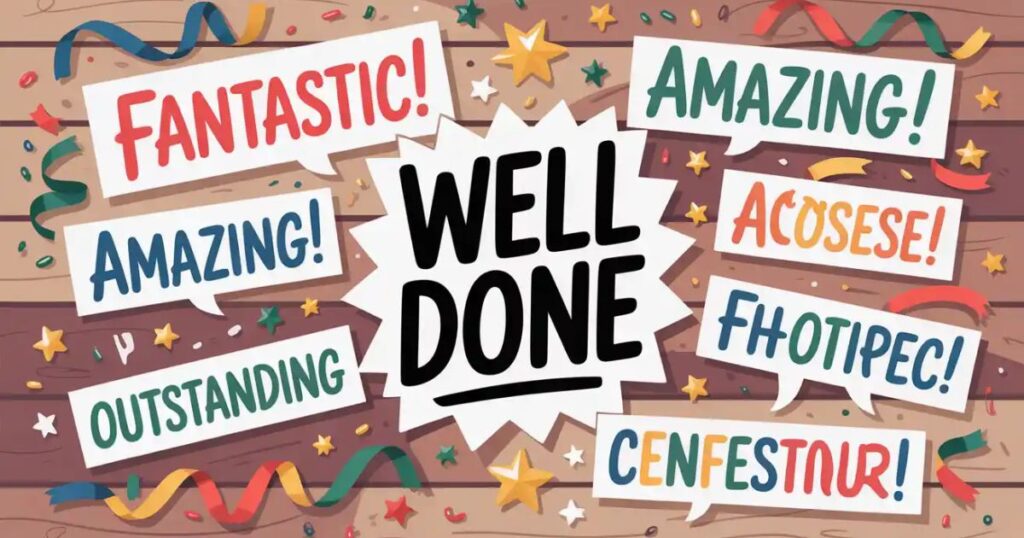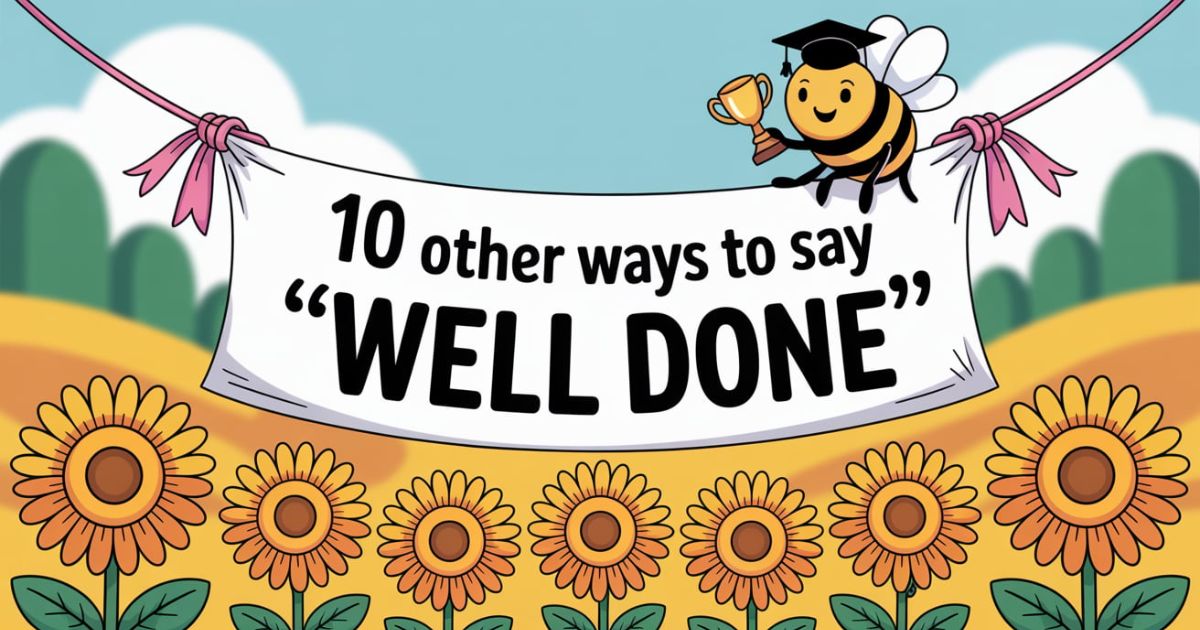Well done is a simple and powerful way to praise someone. You can say well done to a friend, a coworker, or even a child. It shows that you noticed their effort. It means you respect their hard work. Saying well done can make someone feel proud and happy.
But sometimes, saying well done again and again can feel boring. That’s why it helps to use new ways to say it. You can still show appreciation, recognition, and praise, but with different words. This keeps your message fresh. It also shows you care. Whether at work, school, or home, the right words matter. So next time you want to say well done, try saying it in a new way. But remember, no matter how you say it, the feeling behind well done is always important.

Saying “well done” is a classic way to express praise and recognition, but using varied phrases adds depth and meaning. Alternatives like “Outstanding!”, “You nailed it!”, and “You hit it out of the park!” offer more personalized affirmation, making your compliments feel sincere, thoughtful, and emotionally impactful.
Expressions of appreciation help you recognize someone’s effort, achievement, or personal success in a meaningful way. Phrases like “Bravo!”, “Kudos!”, and “Hats off to you!” convey genuine admiration and respect. They add warmth to your praise, whether you’re in a professional setting, offering verbal praise, or celebrating everyday wins.
Example: “Bravo! That was an outstanding performance!”
Meaning: The word bravo comes from Italian, meaning “brave” or “courageous.” Over time, it became a global exclamation of approval, especially in the arts. It shows sincere appreciation and admiration for someone’s performance or effort.
Usage: Commonly used in formal or cultural contexts like theater, music, or any artistic event. It’s a respectful way to offer applause and praise to a performer or individual after a remarkable accomplishment.
Example: “You nailed it! That presentation was top-notch and had everyone engaged.”
Meaning: This idiom comes from the image of driving a nail perfectly into place. It’s now used to praise someone who delivers a precise, skillful result , whether in a project, task, or creative performance.
Usage: Perfect for casual or workplace praise. Use it when a coworker, friend, or team member achieves a goal, aces an exam, or finishes a task with excellence. It adds excitement and personal encouragement.
Example: “Outstanding work on the marketing strategy , the results were better than we imagined!”
Meaning: “Outstanding” means something that stands out from the rest because of its superior quality. It’s a high-level compliment often used to express approval and recognition for effort and accomplishment.
Usage: Great for formal settings like a professional review or academic context. It’s also effective in personal conversations when acknowledging someone’s success or milestone. This expression of excellence fits any achievement that deserves compliments and admiration.
Example: “Kudos to you for organizing such a successful event , everything ran smoothly.”
Meaning: Borrowed from Greek, kudos means glory or renown. In English, it’s used to offer verbal praise and public recognition for someone’s success, often highlighting their skills, efforts, or leadership.
Usage: Useful in both casual and professional settings. Whether it’s a teammate completing a difficult task or an employee delivering results, kudos adds a sincere tone of acknowledgment and encouragement.
Example: “You finished the entire project ahead of schedule and under budget , hats off to you!”
Meaning: Originally a gesture of respect, taking one’s hat off now symbolizes verbal appreciation. It shows deep respect, admiration, and approval for someone’s effort or achievement.
Usage: Works well in both informal chats and formal announcements. Whether it’s a workplace accomplishment or a personal success story, this phrase communicates heartfelt affirmation and sincere praise.
Read More: 12 Other Ways to Say “Bro”
Affirmations of excellence highlight someone’s exceptional performance or consistent improvement. Phrases like “You’re on fire!”, “Top-notch!”, and “You’ve outdone yourself!” offer heartfelt admiration and encouragement. They’re perfect for recognizing a person’s skill, success, or growth , especially in the workplace, academic context, or personal achievements that deserve applause.
Example: “Another flawless report and client praise? You’re on fire!”
Meaning: This energetic phrase comes from sports commentary, where a player performing exceptionally is said to be “on fire.” It shows excitement, admiration, and recognition of a streak of accomplishments or peak performance.
Usage: Perfect for informal settings like workplace banter or casual conversation with a friend or coworker. Whether someone is consistently delivering great results or showing rapid improvement, this phrase expresses enthusiasm and sincere praise.
Example: “Your design for the new product launch was absolutely top-notch!”
Meaning: “Top-notch” refers to the highest standard or quality. It’s a concise way to show appreciation and approval for someone’s skill, creativity, or effort , whether in design, task execution, or any kind of achievement.
Usage: Works well in both professional settings and everyday interactions. Whether complimenting a colleague’s project or a friend’s effort, this term shows genuine recognition for outstanding performance or craftsmanship.
Example: “This presentation is your best one yet , you’ve outdone yourself!”
Meaning: This phrase is a heartfelt compliment that acknowledges someone has surpassed their own previous efforts. It’s a strong affirmation of improvement, excellence, and personal growth.
Usage: Ideal for recognizing personal milestones or extraordinary achievements in a formal setting or personal conversation. It’s especially meaningful when someone exceeds expectations in a project, task, or creative endeavor.
Example: “You solved that problem in no time. That’s the way to do it!”
Meaning: This phrase affirms someone’s method or approach as correct, effective, or impressive. It’s both encouraging and validating, emphasizing that the individual handled the task exceptionally well.
Usage: A versatile option for workplace interactions, academic settings, or even at home. It combines verbal praise with a teaching moment, often used with children, employees, or teammates after a success.
Example: “Your pitch was so engaging and effective , you hit it out of the park!”
Meaning: Borrowed from baseball, this phrase means to do something with exceptional success. It’s a lively, informal way to express admiration for someone who has far exceeded expectations.
Usage: Common in casual conversation, but still appropriate in many professional settings like presentations or event reviews. Whether a colleague nails a meeting or a team delivers a standout performance, this idiom delivers a strong, enthusiastic compliment.
Not every phrase fits every moment. The best way to show genuine appreciation is to choose the expression that matches the setting, the relationship, and the tone of the moment. Whether you’re in a professional setting or chatting with a friend, context matters.
- In the workplace or a formal setting, stick with expressions that sound respectful and polished. Phrases like “Outstanding!”, “Top-notch!”, or “Kudos!” work well in performance reviews, meetings, or email acknowledgments. These show admiration, praise, and recognition without sounding too casual.
- In informal settings or during a casual conversation with a friend, coworker, or team member, feel free to use more energetic phrases. “You’re on fire!” or “You nailed it!” can add excitement and enthusiasm. These expressions carry emotional expression and heartfelt affirmation, making your praise feel more sincere and personal.
- For academic achievements or moments of significant accomplishment , like passing an exam, completing a big project, or reaching a milestone , you might say “You’ve outdone yourself!” or “That’s the way to do it!” These phrases highlight effort, improvement, and success, making the recipient feel truly seen and appreciated.
- If someone’s delivered a powerful performance , in theater, music, or art , use phrases with cultural flair, such as “Bravo!” or “Hats off to you!” These carry both historical respect and an exclamation of approval, perfect for formal moments and expressive praise.
- And when someone hits it out of the park , whether it’s a sales pitch, event planning, or problem-solving , say just that. It’s fun, encouraging, and shows that their result exceeded expectations.
- No matter the phrase you choose, make sure your verbal praise is backed by sincerity. Whether it’s a colleague, child, or employee, your words of encouragement, affirmation, and acknowledgment go a long way. Think of it as matching your message with your moment , that’s how you make your compliments truly count.
Saying well done is always a good choice. It shows appreciation, respect, and recognition. But using different ways to say well done can make your praise feel more special. Phrases like bravo, kudos, or you nailed it can bring more emotion. They also make your words sound more personal and thoughtful. No matter what, the meaning behind well done stays strong.
Use well done in the workplace, at home, or with friends. It fits every setting, formal or casual. A good well done can lift someone’s mood. It can also build confidence. So, keep saying well done, but don’t be afraid to mix it up. Try other phrases that still show admiration and praise. The more you practice, the better your words will feel. In the end, a simple well done still carries a big message. Keep using it. Keep making people feel proud.
Well done means you appreciate someone’s good work. It shows praise, recognition, and respect for their success or effort.
Say well done after someone finishes a task, wins, improves, or achieves a goal. It fits both casual and formal moments.
Yes, saying well done at work builds morale. It’s a simple way to show support and encourage your coworkers or team.
You can say well done with phrases like bravo, kudos, or outstanding. These make your message fresh and more personal.
Not at all. Well done works great with friends too. It’s friendly, warm, and shows you truly admire what they did.

Grammarbeam is a smart language assistant built for clarity, creativity, and precision. From polishing grammar to exploring rich synonyms and refining sentence structure, Grammarbeam is your go-to tool for powerful communication. If you’re writing for school, business, or just for fun — let your words shine with Grammarbeam.

